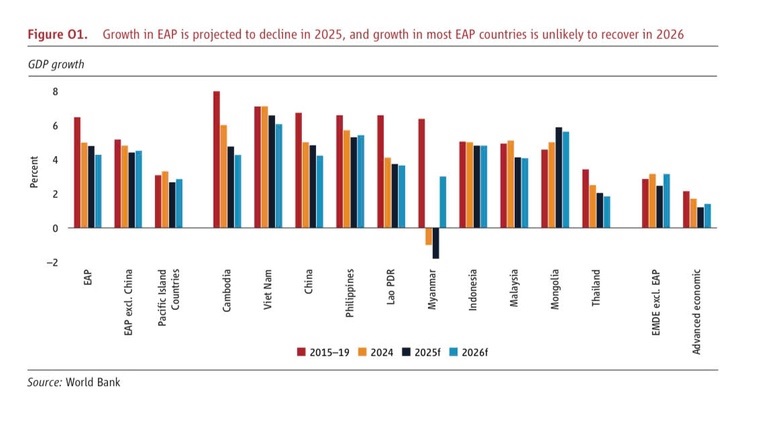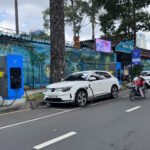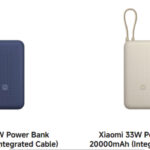
Vietnam leads with a projected growth rate of 6.6%, followed by Mongolia at 5.9% and the Philippines at 5.3%.
|
Vietnam’s Growth Forecast at 6.6% for 2025
According to the World Bank’s (WB) East Asia and Pacific Economic Update released on October 7, 2025, the region is expected to grow at 4.8%, a slight decline from 5.0% in 2024. Vietnam takes the lead with a projected growth rate of 6.6%, followed by Mongolia at 5.9% and the Philippines at 5.3%. Meanwhile, China, Cambodia, and Indonesia are forecasted to grow at 4.8%, with Pacific island nations at 2.7% and Thailand at 2%.
The report highlights that the inclusive growth model that once fueled East Asia’s success is now facing new challenges. Most recent job creation stems from the informal services sector, characterized by low productivity and limited career advancement. Youth face difficulties in securing employment, and women’s labor force participation remains low. While 25 million people are expected to escape poverty between 2025 and 2026, the risk of falling back into poverty remains high.
Carlos Felipe Jaramillo, World Bank Vice President for East Asia and the Pacific, noted: “The region faces a paradox—strong growth but a shortage of quality jobs. Bold reforms to remove market entry barriers, foster competition, and unlock private investment will make businesses more dynamic and create sustainable employment opportunities.”
High-frequency indicators suggest a slowing momentum. While retail sales are rising and industrial production remains steady, consumer and business confidence is weak. Exports show signs of growth ahead of new tariffs, but new orders have yet to recover.
For 2026, regional growth is projected to slow to 4.3%, driven by trade barriers, global uncertainties, and reliance on fiscal stimulus rather than structural reforms.
Vietnam: A Regional Bright Spot
Amid regional volatility, Vietnam stands out with its robust recovery in manufacturing and consumption. The World Bank commends its flexible policy management, effective inflation control, and post-pandemic business support.
At the report’s launch on October 7, Aaditya Mattoo, World Bank Chief Economist for East Asia and the Pacific, stated: “Around 80% of new jobs in Vietnam are created by dynamic young firms, a positive sign of the private sector’s vitality.”
Mattoo emphasized that while Vietnam has deepened specialization in high-value-added industries and services, “institutional reforms and labor productivity enhancements will be crucial” for leveraging global supply chain shifts.
Vietnam’s participation in regional production networks remains modest. Accelerating economic restructuring and governance capacity is essential for sustaining growth.
The report also addresses the impact of new U.S. tariffs on regional trade.
The World Bank advises economies to avoid short-term stimulus dependence, focusing instead on long-term reforms such as improving education quality, simplifying business procedures, and enhancing public investment efficiency. This will create a “virtuous cycle” of opportunities and capabilities, driving higher employment and growth.
“For Vietnam, expanding export markets is vital, but strengthening domestic demand, innovation, and digital transformation in the private sector are equally critical. Enhancing labor productivity is key to transitioning to a high-quality growth model led by value-added sectors,” the World Bank recommends.
– 19:35 07/10/2025
Vietnamese Billionaire Pham Nhat Vuong Launches New Company, Set to Revolutionize Industry Where Vietnam Ranks Top 12 Globally and Leads ASEAN
This is the pivotal piece that completes the five-pillar vision set forth by Vingroup under the leadership of Phạm Nhật Vượng.
Deputy Minister Nguyen Duc Chi: Ministry of Finance Has Not Received Any Proposals from Businesses Regarding the Pilot Implementation of Cryptocurrency Transactions
According to Deputy Minister Nguyen Duc Chi, as of now, the Ministry of Finance has not received any proposals from businesses regarding the pilot implementation of cryptocurrency transactions. However, the Ministry is aware that several companies have already begun preparations for such initiatives.
What Competitive Advantage Enables Masan MEATLife to Optimize Operational Efficiency and Sustain Growth Momentum?
Modern consumers are no longer satisfied with simply choosing fresh and healthy food. They demand transparency, prioritizing products with clear origins, ethical production processes, and guaranteed nutritional value to safeguard the well-being of their families.




















